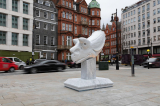
American government lawyers are striving to keep "law enforcement" documents related to Prince Harry's visa application confidential, arguing that their
publication would result in "stigma."
This argument is detailed in a 53-page court transcript, set to be released last night. The development follows a February hearing where a think-tank contended that details of the Duke of Sussex's March 2020 visa application—particularly his responses to questions about drug use—should be disclosed.
The Department of Homeland Security (DHS) lawyers argue in the transcript that Prince Harry has a right to privacy and that his visa documents should remain sealed. When questioned by the judge about the privacy interests being asserted on Harry's behalf, DHS lawyer John Bardo explained, "Many of these records, Your Honour, are law enforcement records. So there is a stigma associated with being mentioned in a law enforcement record."
Prince Harry at The Invictus Games 10th Anniversary Service at St Paul's Cathedral on May 8. American government lawyers are fighting to keep 'law enforcement' documents related to Prince Harry's visa application secret, claiming there would be 'stigma attached' if they were published.
Bardo also noted that the records contain "confidential law enforcement tools and techniques." This marks the first mention of law enforcement records in connection with Prince Harry's visa case. An LA-based immigration lawyer remarked that the term "stigma" is unusual in such contexts, raising questions about the nature of the records.
The Heritage Foundation, a conservative think-tank, is suing the DHS to release all documents related to Prince Harry's entry and residency in the United States. Visa applicants must disclose whether they have ever been drug abusers or addicts. In his memoir, Spare, Prince Harry admitted to using cocaine, psychedelic mushrooms, and marijuana.
The Heritage Foundation argues that Harry's admissions in his autobiography negate his right to privacy. However, DHS lawyer Bardo countered that Spare "isn't sworn testimony or proof."
Judge Carl Nichols is currently reviewing the documents privately and is expected to make a decision within weeks on whether they should be made public. Photo by Minerva97, Wikimedia commons.









































